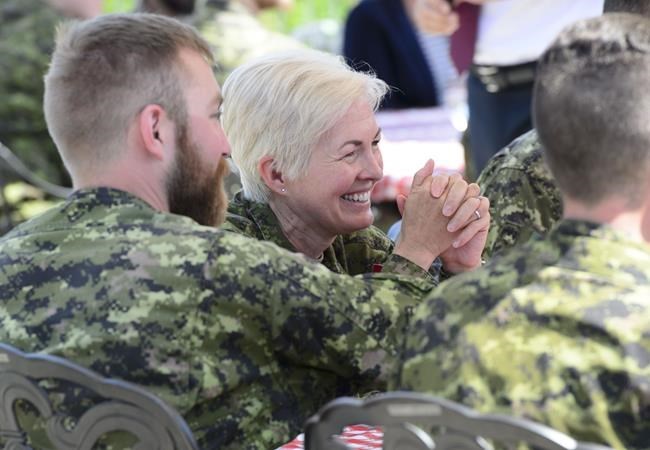OTTAWA — The Canadian Armed Forces will end its "inflexible and inhuman" mandatory reporting policy this winter, its chief of professional conduct and culture said on Wednesday.
Lt.-Gen. Jennie Carignan said military members will still be able to report misconduct, but they will no longer face possible penalties for failing to report something they experience or witness.
"The repeal of duty to report will not limit a member's ability to report incidents," she said. "The intention is to remove the obligation to report."
The change is meant "to create space for members to exercise discretion" when it comes to incidents of an interpersonal nature.
"In many cases (the duty to report) has caused survivors additional harm by taking away their agency and control over the reporting process," Carignan said.
Carignan said there have been lengthy discussions and consultations aimed at ensuring the changes don't inadvertently make things worse.
"I'm absolutely convinced that we have the solution now, and much more comfortable implementing than maybe I was a year ago," she said.
Repealing the duty to report was one of the 48 recommendations made by former Supreme Court justice Louise Arbour in her May 2022 review of military culture.
The current rules state that Armed Forces members must "report to the proper authority any infringement of the pertinent statutes, regulations, rules, orders and instructions governing the conduct of any person subject to the Code of Service Discipline." This was first implemented in the 1930s.
In 2015, in response to a separate report on sexual misconduct that found victims under-reported incidents because of a fear of reprisal and mistrust of the investigation process, the military re-emphasized that its members are obligated to report incidents.
Arbour noted that subsequent reports by the auditor general in 2018 and by a House of Commons committee in 2019 found that the rules needed clarity, but that attempts to create change fell short.
"Failing to report sexual misconduct did not come from any notion that reporting was optional — quite the opposite," Arbour wrote.
"The factors causing under-reporting were well-documented. Even worse, it rapidly became apparent that this new order not only did nothing to fix the problem of under-reporting, it instead created its own set of problems."
She found that the duty to report was not being enforced — just four charges had been laid since 1999 related to failing to report sexual misconduct — and that CAF members widely said they would not report such incidents against the victim's wishes.
But she found victims were sometimes uncertain if they could confide in someone else, including health-care providers and chaplains, without triggering their duty to report.
The provision "creates considerable fear and anguish, and has obviously never achieved its intended purpose of ensuring an appropriate response to sexual misconduct by the chain of command," Arbour wrote, in concluding that the duty to report should be abolished when it comes to sexual misconduct.
Carignan said the military is going further, ending the duty to report altogether. The changes will come into force sometime this winter after a transition period.
"As the repeal unfolds, (the Defence Department) and CAF will examine whether there are specific circumstances where reporting should be mandatory and prescribed in other orders and directives," Carignan said, adding that this could include any incident where someone is in danger.
The military is also working to overhaul its complaints system, though officials said that work is likely to take more than a year and precise timelines are not available.
At present, there are case managers at 16 locations across the country who deal with complaints about CAF members.
Carignan said her team has mapped out the "hugely complex" complaint system and the various mechanisms by which members can report grievances with a view to creating a digital portal.
"That will allow people to report and consolidate complaints in a more user-friendly, victim-centred (way)," she said.
This report by The Canadian Press was first published Aug. 30, 2023.
Sarah Ritchie, The Canadian Press



